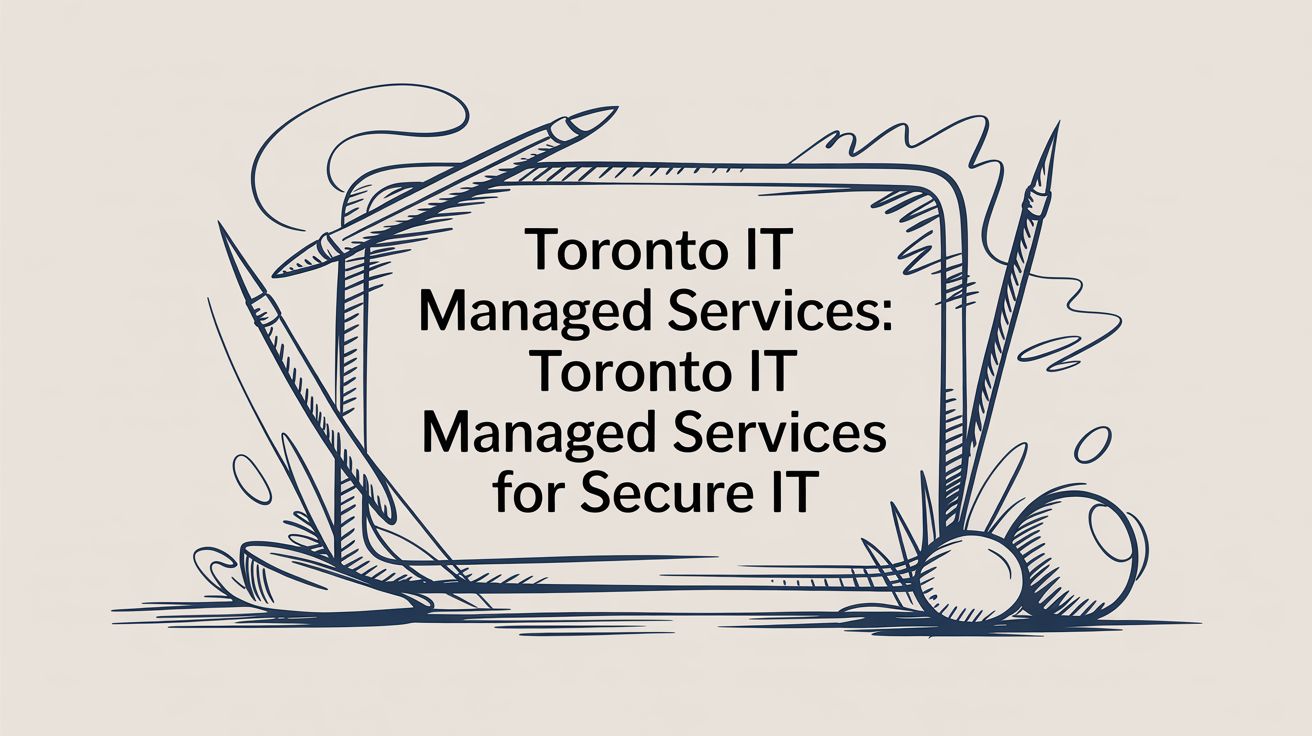
December 25, 2025
A Business Leader's Guide to Toronto IT Managed Servicestoronto it managed services can secure data, streamline IT, and boost growth - discover the right partner today.
Read Full Post%20(1).webp)
Usman Malik
Chief Executive Officer
September 9, 2024
.jpg)
Imagine this scenario: Your business is growing rapidly, and with that growth comes an increasing reliance on technology. Suddenly, managing IT issues becomes a constant struggle.
Downtime, slow networks, and outdated systems are hindering your productivity. Your in-house team is stretched thin, and instead of focusing on core business activities, they’re constantly troubleshooting IT problems. If this sounds familiar, it might be time to consider the benefits of managed IT services.
So, what are managed IT services? Essentially, they involve outsourcing your IT needs to a third-party managed service provider (MSP).
This provider takes on the responsibility of managing and monitoring your IT infrastructure, ensuring everything runs smoothly.
Instead of reacting to problems as they arise, an MSP takes a proactive approach to identify and fix issues before they escalate. This managed services model allows businesses to focus on their core operations, knowing that their IT needs are in expert hands.

Before diving into the signs that your business might need managed IT services, let's explore the 10 benefits of managed IT services and why they are a game-changer for many companies.
One of the key advantages of using managed IT services is the proactive approach to IT management. Instead of waiting for issues to occur, an MSP continuously monitors your systems, identifying potential problems and resolving them before they disrupt your operations.
This proactive stance ensures that your business experiences minimal downtime, which is crucial for maintaining productivity and achieving your business goals.
Managed IT services typically operate with a fixed monthly fee, allowing businesses to budget more effectively. This predictable cost structure contrasts with the fluctuating expenses associated with an in-house team.
By outsourcing to a managed service provider, you avoid the high costs of hiring, training, and retaining IT staff, as well as the expenses of purchasing and maintaining IT equipment.
An MSP provides access to a team of IT professionals with a wide range of skill sets. This ensures that your business benefits from the latest technology trends, industry best practices, and the expertise needed to handle complex IT issues.
Many businesses lack the resources to build such a diverse in-house IT team, making this access one of the most significant benefits of managed IT services.
With the increasing threat of data breaches and cyberattacks, security is more important than ever. Managed IT services include robust security measures such as firewalls, encryption, and regular security audits to protect your data and keep your business safe.
An MSP ensures that your security protocols are up-to-date, compliant with regulations, and capable of responding to emerging threats.
As your business grows, so do your IT needs. Managed services enable your business to scale its IT resources up or down as needed without the burden of managing the logistics.
Whether you’re expanding into new markets or adjusting to seasonal demands, an MSP can quickly adjust your IT infrastructure to support your evolving business environment.
Another one of the benefits of managed IT services is disaster recovery solutions, ensuring that your data is backed up and can be quickly restored in the event of an outage or cyberattack.
This capability is essential for maintaining business continuity and minimizing the impact of unexpected disruptions on your operations.
By outsourcing IT management to an MSP, your internal team can focus on core business activities instead of getting bogged down with IT issues. This shift allows you to allocate more resources and attention to areas that drive growth and innovation, ultimately pushing your business forward.
Staying compliant with industry regulations can be complex and time-consuming. Managed IT services providers are well-versed in the compliance requirements for various industries, including financial services and healthcare.
They can help ensure that your systems and processes are compliant, reducing the risk of fines and legal complications.
An MSP keeps your IT infrastructure up-to-date with the latest hardware, software, and cloud computing solutions. This access allows your business to benefit from cutting-edge technology without having to pay for expensive upgrades or replacements.
Using managed IT services means your technology remains current and competitive in the ever-changing tech landscape.
When you partner with an MSP, you gain a single point of contact for all your IT needs. This streamlined communication simplifies support requests, making it easier to resolve issues quickly.
Instead of dealing with multiple vendors and service providers, you have one managed service provider who understands your specific business needs and can provide tailored business solutions.

Now that we've covered the 10 benefits of managed IT services, let's delve into the 7 ways to tell if your business is ready for managed IT services.
Is your business struggling with IT challenges or rapid growth? Evaluating business priorities is crucial for determining if organizations need managed IT services to streamline operations and achieve their goals efficiently.
Discover the essential indicators that signal when it's time to consider managed IT services for your organization:
If your IT costs vary significantly from month to month, it might be time to consider a managed services model. Managed IT services operate with a fixed monthly fee, allowing you to budget more accurately and avoid unexpected expenses.
This cost predictability is particularly beneficial for small businesses with limited resources.
When your in-house team is constantly putting out IT fires, they’re unable to focus on more strategic initiatives that can drive your business forward. Many companies find that outsourcing to a managed service provider relieves this burden, allowing their IT staff to concentrate on innovation and growth rather than routine maintenance and troubleshooting.
Frequent downtime not only impacts your productivity but also damages your reputation and bottom line. If you find that your systems are down more often than they’re up, it’s a clear sign that you need managed IT services.
An MSP provides remote monitoring and management services to ensure that your systems are always operational, minimize downtime, and keep your business running smoothly.
Security is paramount. If your current security measures are outdated or insufficient to protect against new threats, it’s time to consider managed IT services.
An MSP can implement and manage comprehensive security protocols, including cloud computing safeguards, to protect your business from cyber threats and data breaches.
As your business grows, your IT needs will inevitably become more complex. Whether you’re expanding your workforce, opening new locations, or launching new products, you’ll need an IT infrastructure that can support this growth.
Managed IT services provide scalable solutions that can grow with your business, ensuring that your technology infrastructure can handle increased demand.
If your in-house team lacks the expertise to manage certain aspects of your IT infrastructure, it’s time to consider outsourcing to a managed service provider. An MSP brings a wide range of skill sets to the table, ensuring that your business has access to the knowledge and experience needed to manage your IT environment effectively.
Finally, if IT management is taking time and resources away from your core business activities, it’s a clear sign that you need managed IT services. By partnering with an MSP, you can free up your internal resources to focus on what you do best, whether that’s developing new products, expanding your customer base, or improving your service offerings.

Choosing the right managed IT provider can provide many benefits for your business, from reducing costs to improving security and scalability. If you’re experiencing any of the challenges mentioned above, it might be time to discover the benefits of managed IT services.
By using a managed service provider, you can ensure that your technology infrastructure is in expert hands, allowing you to focus on what truly matters—growing your business. Managed services enable your business to operate efficiently, stay competitive, and achieve your business goals in a rapidly evolving digital landscape.
As business owners, understanding the importance of managed IT services can be the key to unlocking your company’s full potential. Discover the benefits of IT managed services today and see how they can support your business's long-term success.

Ready to experience the benefits of managed IT services tailored to your business needs? At CloudOrbis, we specialize in providing top-notch managed IT services in Mississauga that help you streamline operations, enhance security, and focus on your core business. Our expert team delivers comprehensive support services that keep your IT infrastructure running smoothly so you can concentrate on growing your business.
Discover how CloudOrbis can transform your IT strategy—contact us today to learn more about our managed IT solutions and how we can support your success!

Managed IT services benefits include a wide range of advantages that can significantly improve services for your business. When you choose to work with an MSP, you benefit from managed IT services like 24/7 monitoring, proactive maintenance, and robust security measures.
These services ensure that your technology needs are always met, from maintaining hardware and software to optimizing your IT infrastructure. This allows your internal IT staff to focus on more strategic tasks, ultimately helping your company achieve business goals more efficiently.
When you choose managed IT services, you're opting for a solution that allows your business to operate with fixed monthly costs while ensuring your IT systems are continuously monitored and maintained. This choice enables every business to stay competitive by outsourcing their IT needs to experts, allowing them to focus on business growth rather than IT issues.
Additionally, managed IT services support your business processes by ensuring that your IT infrastructure aligns with your overall business strategy, helping you to streamline operations and reduce downtime.
You need managed IT services when your current IT setup struggles to meet your growing technology needs. If your internal IT staff is overwhelmed or if you're experiencing frequent downtimes, it's time to consider managed IT services.
These services can also be crucial when your hardware and software require regular updates and maintenance that your team can't handle efficiently. By outsourcing to an MSP, you ensure that your IT infrastructure is always optimized and that your business can achieve business goals without interruptions.
Using an MSP provides key benefits, such as access to a team of IT experts who understand the latest technology trends and best practices. MSPs provide a proactive approach to IT management, ensuring your systems are always up-to-date and secure.
They also help you operate with fixed monthly expenses, making budgeting easier and more predictable. By partnering with an MSP, you can benefit from managed IT services that not only keep your IT infrastructure running smoothly but also support your business processes in achieving long-term success.
Finding the right managed IT service provider involves assessing your technology needs and determining which MSP can best support your business processes. Look for a provider that offers a comprehensive range of services, from hardware and software management to 24/7 monitoring and disaster recovery.
The right managed service provider will offer solutions that are tailored to your specific business requirements, helping you to achieve business goals efficiently and cost-effectively.
The benefits of managed IT services include access to a wide range of business solutions that are designed to enhance your IT operations. An MSP can support your business processes by ensuring that your IT systems are reliable, secure, and scalable.
They help you operate with fixed monthly costs, making financial planning more straightforward. Moreover, MSPs allow your internal IT staff to focus on business innovation rather than day-to-day IT maintenance, enabling your company to grow and achieve business goals more effectively.

December 25, 2025
A Business Leader's Guide to Toronto IT Managed Servicestoronto it managed services can secure data, streamline IT, and boost growth - discover the right partner today.
Read Full Post
December 24, 2025
Moodle LMS for Alberta Private Career Colleges: A Guide to Boosting Compliance and OutcomesDiscover how moodle lms for alberta private career colleges can streamline compliance, boost efficiency, and improve student outcomes.
Read Full Post
December 23, 2025
Protecting Sensitive Data in Alberta Private Career Colleges: A Practical GuideProtect student data and stay PIPA-compliant in Alberta private career colleges. Practical guidance on sensitive data in alberta private career colleges.
Read Full Post